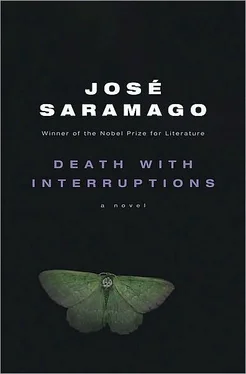José Saramago - Death with Interruptions
Здесь есть возможность читать онлайн «José Saramago - Death with Interruptions» весь текст электронной книги совершенно бесплатно (целиком полную версию без сокращений). В некоторых случаях можно слушать аудио, скачать через торрент в формате fb2 и присутствует краткое содержание. Год выпуска: 2009, ISBN: 2009, Издательство: Houghton Mifflin Harcourt, Жанр: Современная проза, на английском языке. Описание произведения, (предисловие) а так же отзывы посетителей доступны на портале библиотеки ЛибКат.
- Название:Death with Interruptions
- Автор:
- Издательство:Houghton Mifflin Harcourt
- Жанр:
- Год:2009
- ISBN:9780547391601
- Рейтинг книги:4 / 5. Голосов: 1
-
Избранное:Добавить в избранное
- Отзывы:
-
Ваша оценка:
- 80
- 1
- 2
- 3
- 4
- 5
Death with Interruptions: краткое содержание, описание и аннотация
Предлагаем к чтению аннотацию, описание, краткое содержание или предисловие (зависит от того, что написал сам автор книги «Death with Interruptions»). Если вы не нашли необходимую информацию о книге — напишите в комментариях, мы постараемся отыскать её.
Death sits in her chilly apartment, where she lives alone with scythe and filing cabinets, and contemplates her experiment: What if no one ever died again? What if she, death with a small
became human and were to fall in love?
Death with Interruptions — читать онлайн бесплатно полную книгу (весь текст) целиком
Ниже представлен текст книги, разбитый по страницам. Система сохранения места последней прочитанной страницы, позволяет с удобством читать онлайн бесплатно книгу «Death with Interruptions», без необходимости каждый раз заново искать на чём Вы остановились. Поставьте закладку, и сможете в любой момент перейти на страницу, на которой закончили чтение.
Интервал:
Закладка:
Naturally, one must ask if the government was merely standing by and impassively watching the daily drama being lived out by the country's ten million inhabitants. The answer is twofold, affirmative on the one hand and negative on the other. Affirmative, although only in rather relative terms, because dying is, after all, the most normal and ordinary thing in life, a purely routine fact, an episode in the endless legacy passed from parents to children, at least since adam and eve, and world governments would do enormous harm to the public's precarious peace of mind if they declared three days of national mourning every time some poor old man died in a home for the destitute. And negative because it would be impossible, even if you had a heart of stone, to remain indifferent to the palpable fact that the week's notice given by death had taken on the pro portions of a real collective calamity, not just for the average of three hundred people at whose door ill luck came knocking each day, but also for the people who remained, neither more nor less than nine million nine hundred and ninety-nine thousand and seven hundred people of all ages, fortunes and conditions, who, each morning when they woke from a night tormented by the most terrible nightmares, saw the sword of damocles hanging by a thread over their head. As for the three hundred inhabitants who had received the fateful violet-colored letter, responses to the implacable sentence varied, as is only natural, depending on the character of each individual. As well as those people mentioned above who, driven by a twisted idea of revenge to which one could quite rightly apply the neologism prepost-humous, decided to abandon their civic and familial duties by not writing a will or paying their back taxes, there were many who, acting on a highly corrupt interpretation of the horatian carpe diem, squandered what little life was left to them by giving themselves over to reprehensible orgies of sex, drugs and alcohol, thinking perhaps that by falling into such wild excesses, they might bring down upon their own heads some fatal stroke or, if not, a divine thunderbolt which, by killing them there and then, would snatch them from the grasp of death proper, thus playing a trick on death that might well make her change her ways. Others, stoical, dignified and courageous, went for the radical option of suicide, believing that they, too, would be teaching a lesson in manners to the power of thanatos, delivering what we used to call a verbal slap in the face, of the sort that, in accordance with the honest convictions of the time, would be all the more painful if it had its origin in the ethical and moral arena and not in some primitive desire for physical revenge. All these attempts failed, of course, apart, that is, from those stubborn people who reserved their suicide for the last day of the deadline. A masterly move, to which death could find no answer.
To its credit, the first institution to get a real sense of the mood of the people in general was the catholic apostolic church of rome, to which, since we live in an age dominated by the boom in the use of acronyms in day-to-day communications, both private and public, it might be a good idea to give the easier abbreviation of c.a.c.o.r. It is also true that you would have had to be stone-blind not to notice how, almost from one moment to the next, the churches filled up with distraught people in search of some word of hope, some consolation, a balm, an analgesic, a spiritual tranquilizer. People who, until then, had lived in the consciousness that death was inevitable and that there was no possible escape, but thinking at the same time, since there were so many other people doomed to die, that only by some real stroke of bad luck would their turn ever come around, those same people now spent their time peering from behind the curtains, waiting for the postman or trembling when they returned home, where the dreaded violet-colored letter, worse than a bloody monster with jaws gaping, might be lurking behind the door, ready to leap out at them. The churches did not stop work for a moment, the long queues of contrite sinners, constantly refreshed like factory assembly lines, wound twice round the central nave. The confessors on duty never stopped, sometimes they were distracted by fatigue, at others their attention was suddenly caught by some scandalous detail, but in the end they simply handed out a pro forma penance, so many our fathers, so many ave marias, and then muttered a hasty absolution. In the brief interval between one confessee leaving and the next confessant kneeling down, the confessors would grab a bite of the chicken sandwich that would be their lunch, meanwhile vaguely imagining some compensatory delight for supper. Sermons were invariably on the subject of death as the only way into the heavenly paradise, where, it was said, no one ever entered alive, and the preachers, in their eagerness to console, did not hesitate to resort to the highest forms of rhetoric and to the lowest tricks in the catechism to convince their terrified parishioners that they could, after all, consider themselves more fortunate than their ancestors, because death had given them enough time to prepare their souls with a view to ascending into eden. There were some priests, however, who, trapped in the malodorous gloom of the confessional, had to screw up their courage, god knows at what cost, because they, too, that very morning, had received the violet-colored envelope, and so had more than enough reason to doubt the emollient virtues of what they were saying.
The same was happening with the therapists that the health minister, hastening to imitate the therapeutic aid given by the church, had dispatched to bring succor to the most desperate. It was not infrequent for a psychiatrist, when counseling a patient that crying would be the best way to relieve the pain tormenting him, to burst into convulsive sobs himself when he remembered that he, too, might be the recipient of an identical envelope in the next day's post. Both psychiatrist and patient would end the session bawling their eyes out, embraced by the same misfortune, but with the therapist thinking that if a misfortune did befall him, he would still have seven days to live, one hundred and ninety-two hours. A few little orgies of sex, drugs and alcohol, which he had heard were being organized, would ease his passage into the next world, although, of course, you then ran the risk that such excesses might only make you miss this world all the more intensely when you were up there on your ethereal throne.
...
ACCORDING TO THE WISDOM OF THE NATIONS, THERE IS AN exception to every rule, even rules that would normally be considered utterly inviolable, as for example, those regarding the sovereignty of death, to which, by definition, there never could be an exception, however absurd, and yet it really must be true because, as it happened, one violet-colored letter was returned to sender. Some will object that such a thing is impossible, that death, being ubiquitous, cannot therefore be in any one particular place, from which one can deduce the impossibility, both material and metaphysical, of locating and defining what we normally understand by the word sender, or, in the meaning intended here, the place from which the letter came. Others will also object, albeit less speculatively, that, since a thousand policemen have been looking for death for weeks on end, scouring the entire country, house by house, with a fine-tooth comb, as if in search of an elusive louse highly skilled in evasive tactics, and have still found neither hide nor hair of her, it is as clear as day that if no explanation has yet been given as to how death's letters reach the mail, we are certainly not going to be told by what mysterious channels the returned letter has managed to reach her hands. We humbly recognize that our explanations about this and much more have been sadly lacking, we confess that we are unable to provide explanations that will satisfy those demanding them, unless, taking advantage of the reader's credulity and leaping over the respect owed to the logic of events, we were to add further unrealities to the congenital unreality of this fable, now we realize that such faults seriously undermine our story's credibility, however, none of this, we repeat, none of this means that the violet-colored letter to which we referred was not returned to its sender. Facts are facts, and this fact, whether you like it or not, is of the irrefutable kind. There can be no better proof of this than the image of death before us now, sitting on a chair while wrapped in her sheet, and with a look of blank amazement on the orography of her bony face. She eyes the violet envelope suspiciously, studies it to see if it bears any of the comments postmen usually write on envelopes in such cases, for example, returned, not known at this address, addressee gone away leaving no forwarding address or date of return, or simply, dead, How stupid of me, she muttered, how could he have died if the letter that should have killed him came back unopened. She had thought these last words without giving them much importance, but she immediately summoned them up again and repeated them out loud, in a dreamy tone of voice, Came back unopened. You don't need to be a postman to know that coming back is not the same thing as being sent back, that coming back could merely mean that the violet-colored letter failed to reach its destination, that at some point along the way something happened to make it retrace its steps and return whence it had come. Letters can only go where they're taken, they don't have legs or wings, and, as far as we know, they're not endowed with their own initiative, if they were, we're sure that they would refuse to carry the terrible news of which they're so often the bearers. Like this news of mine, thought death impartially, telling someone that they're going to die on a particular date is the worst possible news, it's like spending long years on death row and then having the jailer come up to you and say, Here's the letter, prepare yourself. The odd thing is that all the other letters from the last batch were safely delivered to their addressees, and if this one wasn't, it can only have been because of some chance event, for just as there have been cases of a love letter, god alone knows with what consequences, taking five years to reach an addressee who lived only two blocks and less than a quarter of an hour's walk away, it could be that this letter passed from one conveyor belt to another without anyone noticing and then returned to its point of departure like someone who, lost in the desert, has nothing more to go on than the trail he left behind him. The solution would be to send it again, said death to the scythe that was next to her, leaning against the white wall. One wouldn't expect a scythe to respond, and this one proved no exception. Death went on, If I'd sent you, with your taste for expeditious methods, the matter would have been resolved, but times have changed a lot lately, and one has to update the means and the systems one uses, to keep up with the new technologies, by using e-mail, for example, I've heard tell that it's the most hygienic way, one that does away with inkblots and fingerprints, besides which it's fast, you just open up outlook express on microsoft and it's gone, the difficulty would be having to work with two separate archives, one for those who use computers and another for those who don't, anyway, we've got plenty of time to think about it, they're always coming out with new models and new designs, with new improved technologies, perhaps I'll try it some day, but until then, I'll continue to write with pen, paper and ink, it has the charm of tradition, and tradition counts for a lot when it comes to dying. Death stared hard at the violet-colored envelope, made a gesture with her right hand, and the letter vanished. So now we know that, contrary to what so many thought, death does not take her letters to the post office.
Читать дальшеИнтервал:
Закладка:
Похожие книги на «Death with Interruptions»
Представляем Вашему вниманию похожие книги на «Death with Interruptions» списком для выбора. Мы отобрали схожую по названию и смыслу литературу в надежде предоставить читателям больше вариантов отыскать новые, интересные, ещё непрочитанные произведения.
Обсуждение, отзывы о книге «Death with Interruptions» и просто собственные мнения читателей. Оставьте ваши комментарии, напишите, что Вы думаете о произведении, его смысле или главных героях. Укажите что конкретно понравилось, а что нет, и почему Вы так считаете.












